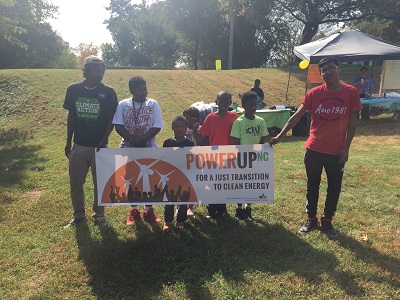 More than 200 local residents came out to Chavis Park in Southeast Raleigh on October 24 and found themselves ‘re-energized’ on how to take action on lowering their energy bills. October is National Energy Awareness Month, which provides an excellent platform to talk about how North Carolinians can reduce their energy costs
More than 200 local residents came out to Chavis Park in Southeast Raleigh on October 24 and found themselves ‘re-energized’ on how to take action on lowering their energy bills. October is National Energy Awareness Month, which provides an excellent platform to talk about how North Carolinians can reduce their energy costs
In order to provide such a platform PowerUp NC held a Weatherization Block Party featuring multiple stations where residents could learn and interact with different energy-efficiency resources. This included hands-on training with foam sealant, which can be applied over cracks in walls to reduce air leakage. All of the materials were provided free of charge.
“I didn’t know what to expect for today’s event. For some folks out here, this is the first interaction with PowerUp NC. For others, they came out because they had heard from their friends or members of our organizing committee that this was something they needed to come to, said Kaji Reyes-Gertes, PowerUp NC organizer.
 For weeks, PowerUp NC organizers and volunteers have been listening to the concerns of local residents. Many cite concerns for affordable housing, sustainable jobs, and high utility bills. PowerUp NC sees energy-efficiency programs as one solution to address all of these. Leading up to this event, the organizers have been doing outreach to churches, Shaw University, local Citizens Advisory Councils, and door-to-door in Southeast Raleigh neighborhood to get the word out.
For weeks, PowerUp NC organizers and volunteers have been listening to the concerns of local residents. Many cite concerns for affordable housing, sustainable jobs, and high utility bills. PowerUp NC sees energy-efficiency programs as one solution to address all of these. Leading up to this event, the organizers have been doing outreach to churches, Shaw University, local Citizens Advisory Councils, and door-to-door in Southeast Raleigh neighborhood to get the word out.
Organizer Erika Moss supervised the table where participants could make their own draft stoppers. “It was wonderful because the kids were able to decorate them and then take them home.”
For Moss, the weatherization station that garnered the most surprise was the free reusable air filters. “People were asking, ‘Does this really mean I don’t have to buy any more air filters?’. Nope, you just wash them with soap and water. It’s something so simple yet incredibly powerful for folks’ wallets and for what it can do for our home.”
Laura Langham, Energy Efficiency Program Manager with the NC Sustainable Energy Association (NCSEA) was also on hand during the block party and played an instrumental role in developing the concepts behind each of these stations. “There is great energy out here today,” remarked Langham. “I spent much of my time developing these concepts. NC League of Conservation Voters has been great about taking the ideas and materials and making it more successful than I could have imagined.”
 Several members of the Raleigh organizing team volunteered their time as well as fellows with Alliance for Climate Education, an organization dedicated to educating young people on the science of climate change and empowering them to take action. Several created displays showing where North Carolina’s energy comes from. Currently, more than 90% of energy consumed comes from fossil fuels; only 5% of energy generated is from renewable sources, such as wind and solar.
Several members of the Raleigh organizing team volunteered their time as well as fellows with Alliance for Climate Education, an organization dedicated to educating young people on the science of climate change and empowering them to take action. Several created displays showing where North Carolina’s energy comes from. Currently, more than 90% of energy consumed comes from fossil fuels; only 5% of energy generated is from renewable sources, such as wind and solar.
What’s next for the Raleigh team? “We’re going to regroup and figure out how to get back into contact with all of the folks who attended,” Gertes-Reyes said. “We also have the upcoming state climate justice summit, which is so connected to the work folks are learning about here.”
PowerUp NC will continue to collaborate with Langham and the NCSEA with two Retrofit Demonstration Projects in the coming weeks: one in Raleigh and one in Winston-Salem. “It’s empowering for me to see elements of our energy-efficiency work have such creativity, really have legs,” Langham shared.
Community residents can connect with PowerUp NC by attending one of its upcoming resiliency hub meetings and by participating in the NC Climate Justice Summit, which will be held November 20 -22 at the Haw River State Park. You can find more information about the Summit at or at ncclimatejustice.org.
PowerUp NC is building a movement for a stronger economy, healthier environment, and a more inclusive democracy. Through public education, advocacy, and organizing, we are advancing energy efficiency and renewable energy projects that lower energy bills, improve housing conditions, and reduce pollution by lowering dependence on fossil fuels. PowerUp NC is a project of the NC League of Conservation Voters.




